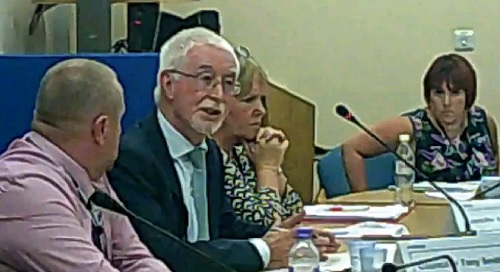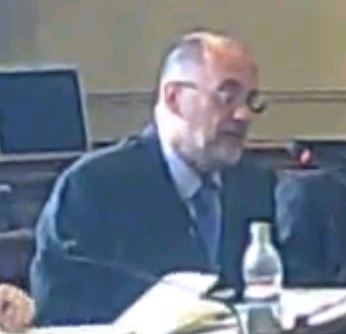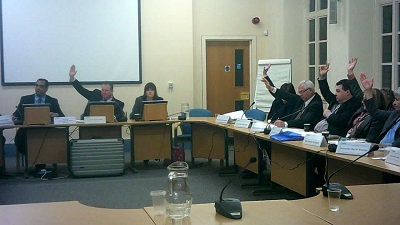Wirral Council valued Lyndale School land and buildings at £2,696,103.00 in February 2013

One of the issues that was raised during the consultation on Lyndale School (and the call in) was how much The Lyndale School would be worth to Wirral Council as an asset if in the future the school was closed, declared a surplus asset and sold by Wirral Council? The 2012/13 asset register assigns a value to the buildings of £1,788,103.00 and land of 908,000.00 (total £2,696,103.00) valued on 22nd February 2013 (as part of its regular quinquennial or five yearly valuation).
A summary of the responses given by David Armstrong at the meetings I was at (such as the consultation meeting in June and the February call in) was that he personally had deliberately not visited the site to avoid the rumour spreading that Wirral Council was disposing of the site and that there were hoops Wirral Council would have to jump through before even getting to that stage, three of those being a decision that the school would have to close, then declared a surplus asset by a politician/s and permissions from the Secretary of State too before even reaching the stage where they could dispose of it.
The issue of the extra capital work on other schools (which costs the council money) to provide extra places for the Lyndale School children if it closed was known and quantified as obviously building work has to start well in advance of being completed due to obtaining planning permission, contract tender rules (such as getting quotes and bids for the work) and the fact that building work on schools tends to be done during school holidays to prevent disruption to what schools are there to do.
What’s interesting is in a recent response to a Freedom of Information request to former councillor Ian Lewis, Wirral Council have (finally) released the 2012/13 asset register. I read the 2012/13 asset register this morning and it does contain an entry for The Lyndale School. Bear in mind this is for the 2012/13 local authority year (1/4/2012 to 30/3/2013) which was audited as part of the audit of that year (12/13)’s accounts at some point between 1/4/13 and 30/9/13.
As is well known already, formal plans to close the Lyndale School became known to the public around December 2013 but there were rumours of closure plans before then. The entry for The Lyndale School is as follows:
RAM Ref Building 000341
RAM Ref Land 000342
NLPG 42069200
Address The Lyndale School
Street Lyndale Avenue
Town Eastham
Postcode CH62 8DE
Description Special School
Controlling Department CYPD
Asset Type PPE
Status Land and buildings
Valuation Basis (See below for definitions) FV(DRC)
Buildings Value (Required for DRC and EUV valuations only) 1,788,103.00
Land Value (Required for DRC and EUV valuations only) 908,000.00
Value (Applies to MV entries only)
Asset Value 2,696,103.00
Value addition check ok
Asset Life Years (Required for DRC & EUV valuations only) 30
Date of revaluation 22/2/2013
Date assets physically verified (if not – state reason) 22/2/2013
Valuer Sarah Duncan
Comments
Valuation year 2012/13
Valuation required 12/13 y
Valuation reasons Quinquennial
Disposal reason
Disposal proceeds
Revisions made y
Is property held solely to earn rentals or for capital appreciation or both?
Is property used in the production or supply of goods or services or for administrative purposes?
Is property for sale in the ordinary course of operations?
Is earning rentals the outcome of a council policy (e.g. regeneration policy)?
Is the property social housing?
Investment Property Classification Not Investment
AHFS Criterion 1: Available for immediate sale, etc?
AHFS Criterion 2: Sale highly probably, etc?
AHFS Criterion 3: Actively marketed?
AHFS Criterion 4: Expected to qualift for recognition as a completed sale within 1 year of date of classification?
AHFS Classification Not AHFS
This entry in the asset register of course raises a lot of questions. A regular five yearly revaluation was done on the Lyndale School in February 2013. Any valuation (if a further one was done) between 1st April 2013 and 30th March 2014 would be on the 2013/14 asset register.
The 2012/13 asset register was audited as part of the 2012/13 accounts over the period 1st April 2013 to 30th September 2013. However the asset register would’ve been available for management purposes well before this audit was complete. Within two months of that audit being complete the public became aware of the plans to close the school.
So management at Wirral Council would’ve had the Lyndale School valuation from February 2013 available in informing their plans (whether they asked for this information to be provided is another question though).
However, as the school and land that The Lyndale School is on is an asset of Wirral Council now used for education (and specifically adapted for use as a special school), surely it makes no economic sense to close it down?
If it’s closed, the costs of the building (Council Tax, maintenance etc) will still be there.
If it’s closed, the children would be moved to another school so staff costs would stay, Wirral Council would be paying for building costs on two buildings then, the school they move to and Lyndale School sitting empty.
If we look back to the closure of Cole Street Primary School in Birkenhead, there was a very long time between the school being closed and it being sold. During this time it appeared to be unused each time I passed it especially after it was declared surplus to requirements.
There is another question this raises though.
Do the capital works on buildings to increase places elsewhere in the schools system so the Lyndale School children have somewhere to go to should the school close exceed the valuation of the Lyndale School?
If they do, then don’t these plans not make any economic sense whatsoever (unless I’m missing something)?!
The Cabinet decision on 4th September to go ahead to the next stage on closing Lyndale School was “called in” by Conservative and Liberal Democrat councillors yesterday (lead signatory Cllr Paul Hayes (Conservative)) and will now not be implemented until there is a future meeting of the Coordinating Committee soon to decide what to do next.
If you click on any of these buttons below, you’ll be doing me a favour by sharing this article with other people. Thanks:

